Charles E W Bean, Diaries, AWM38 3DRL 606/226/1 - Folder - Part 9
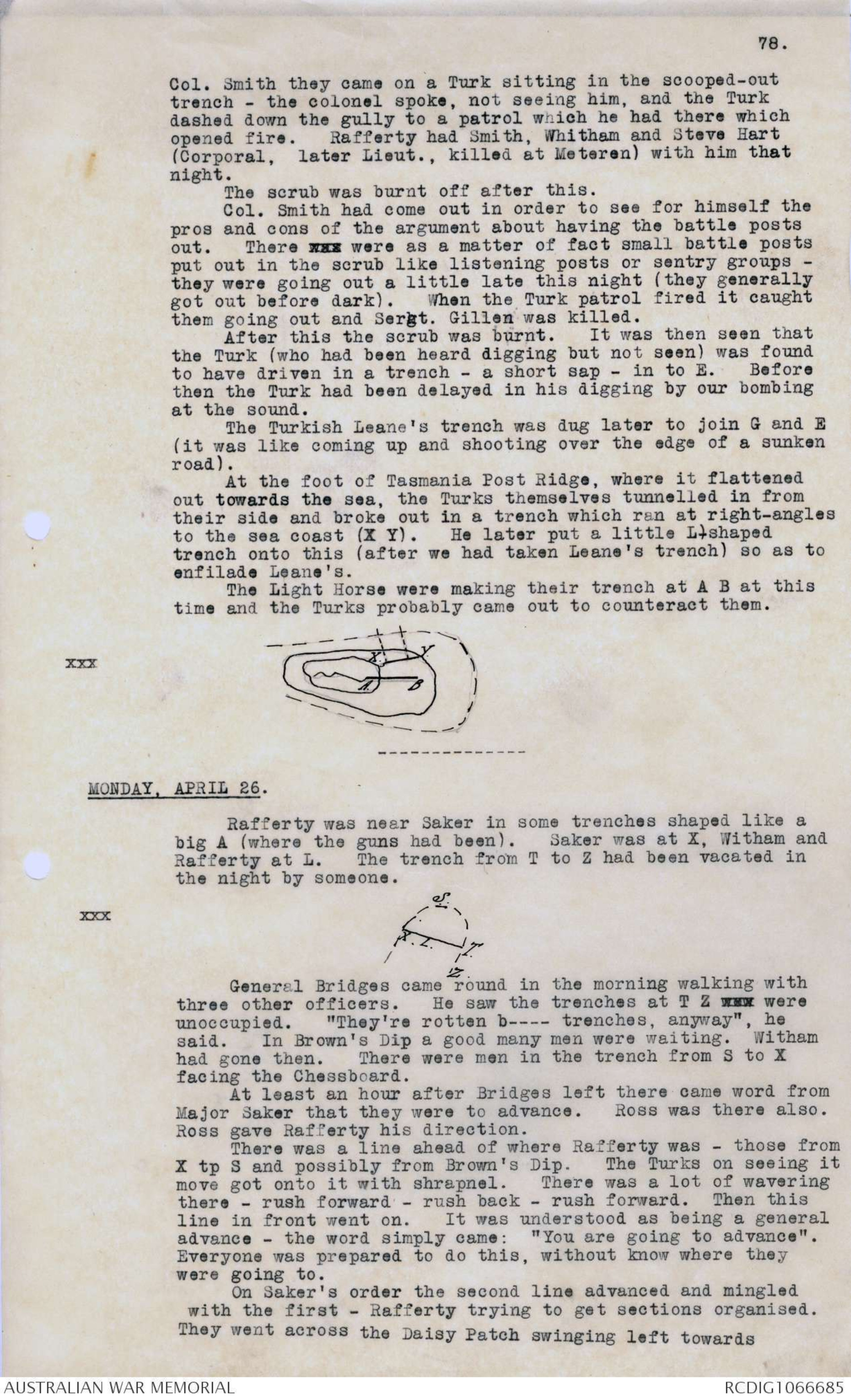
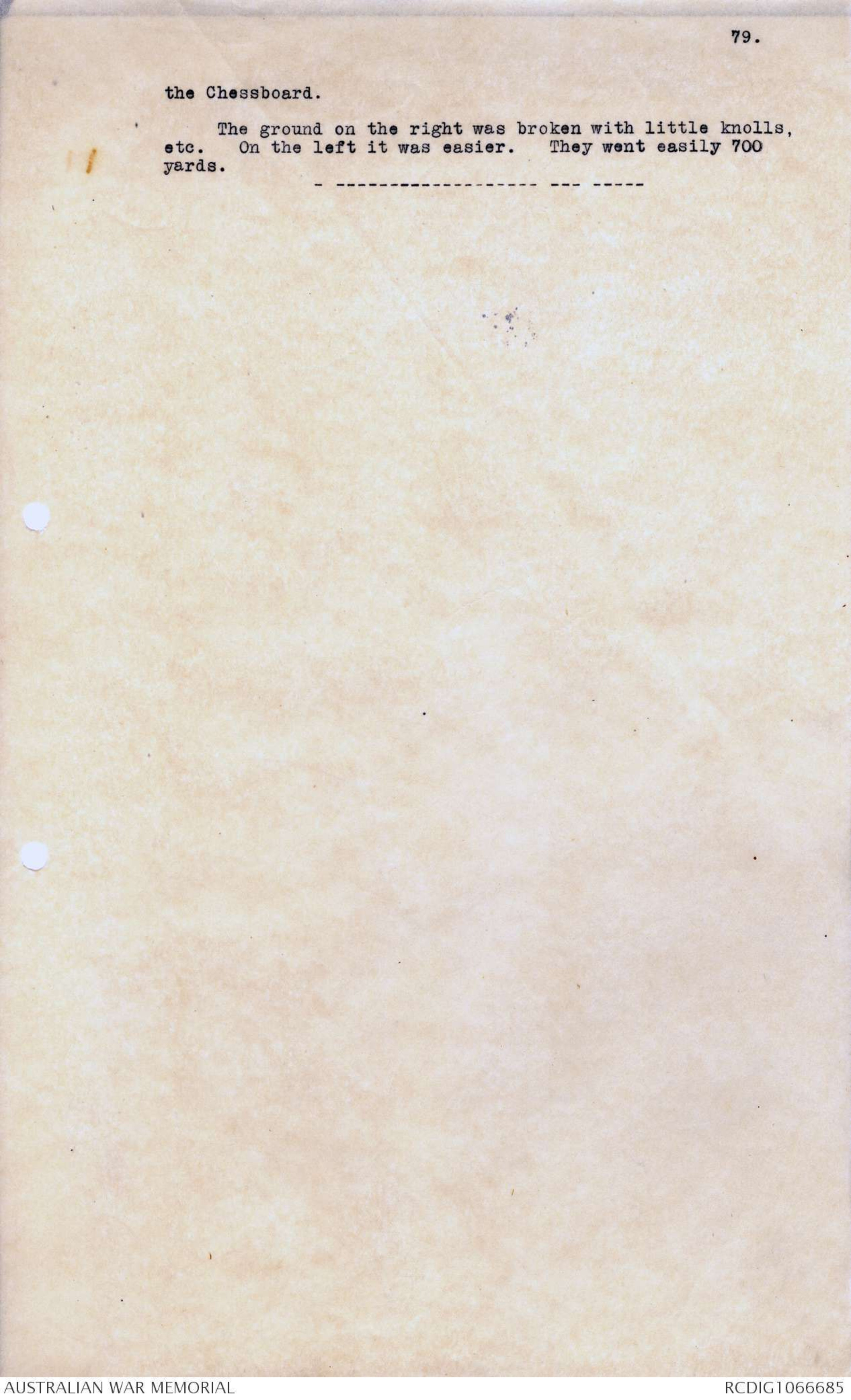
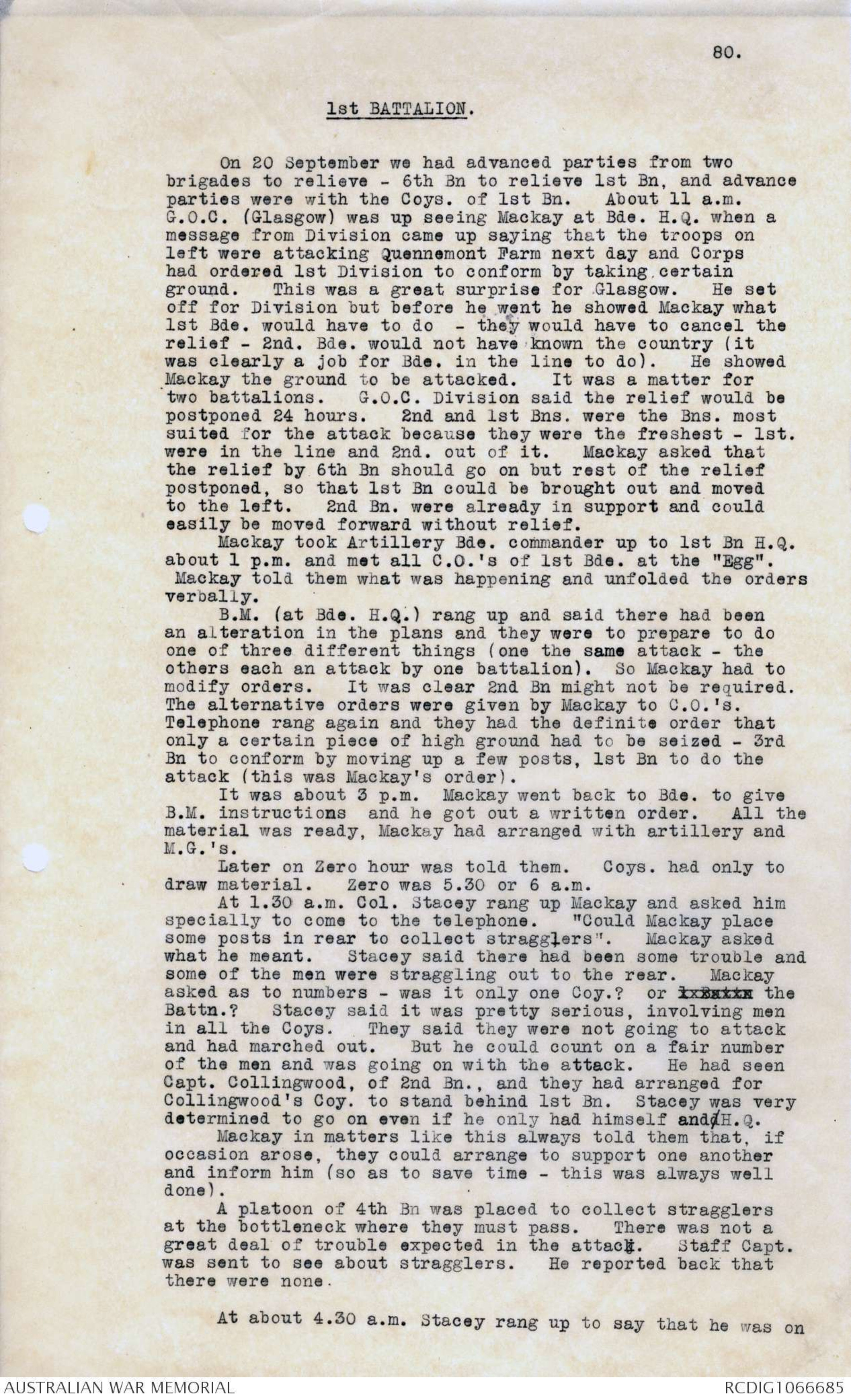
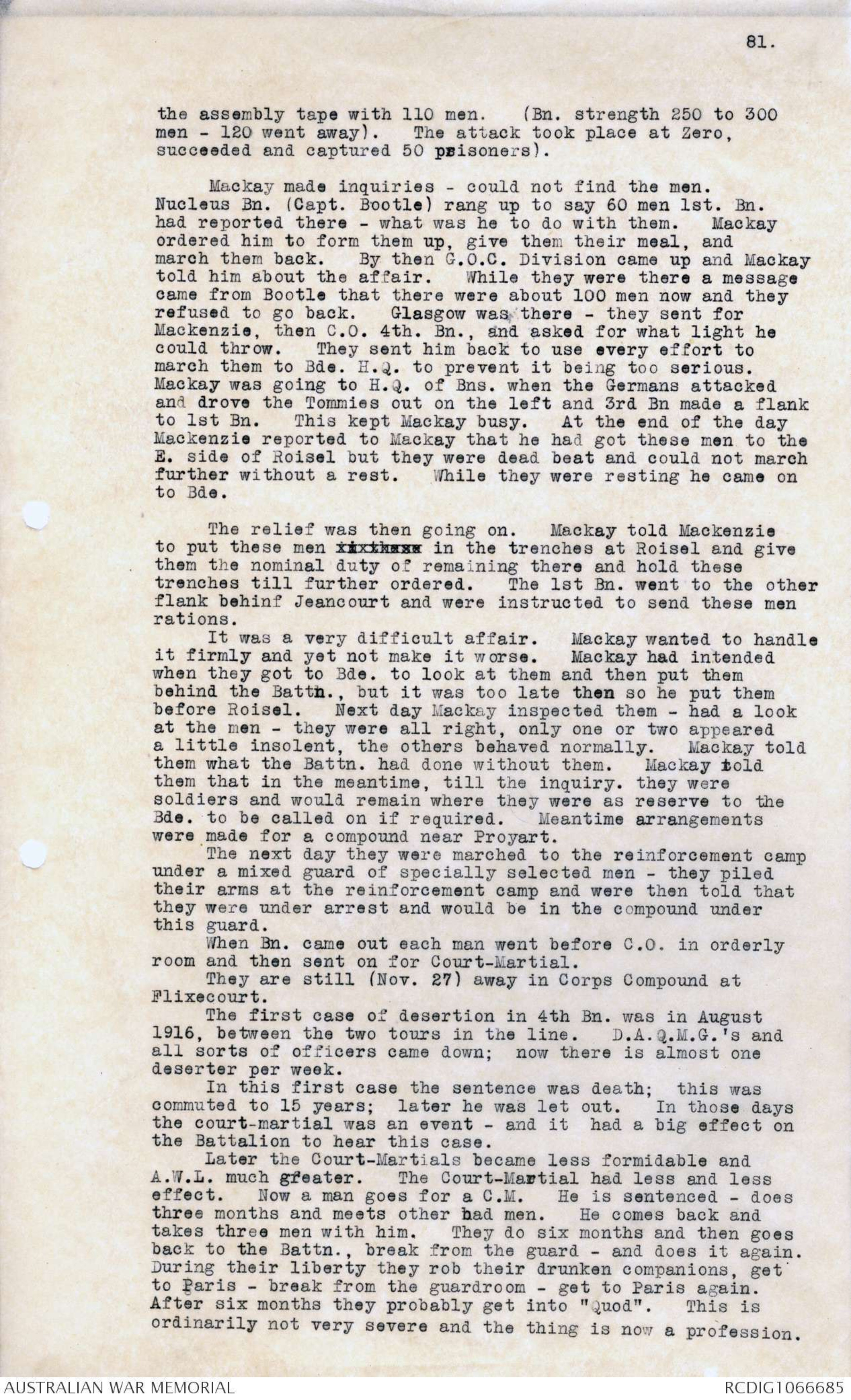
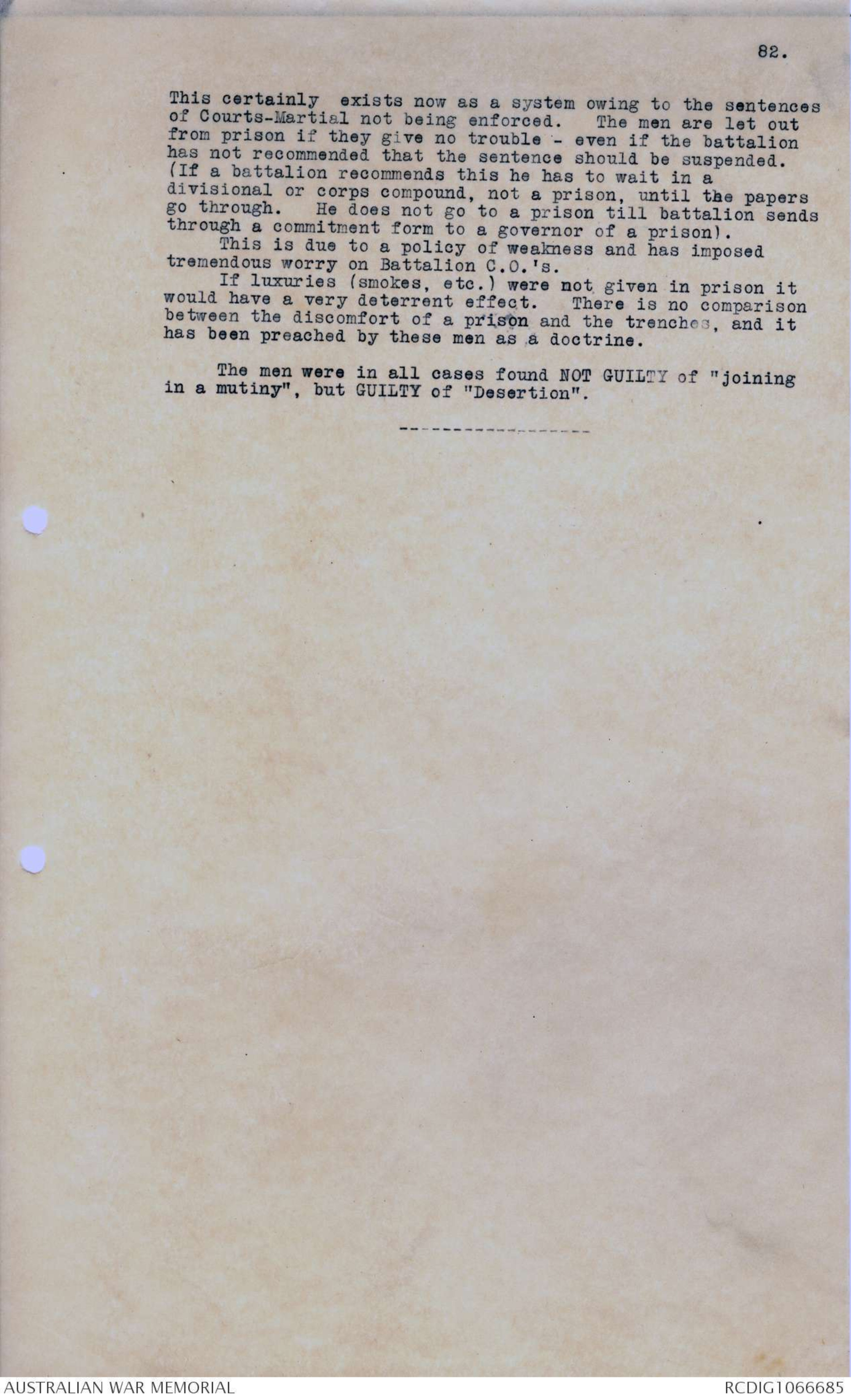
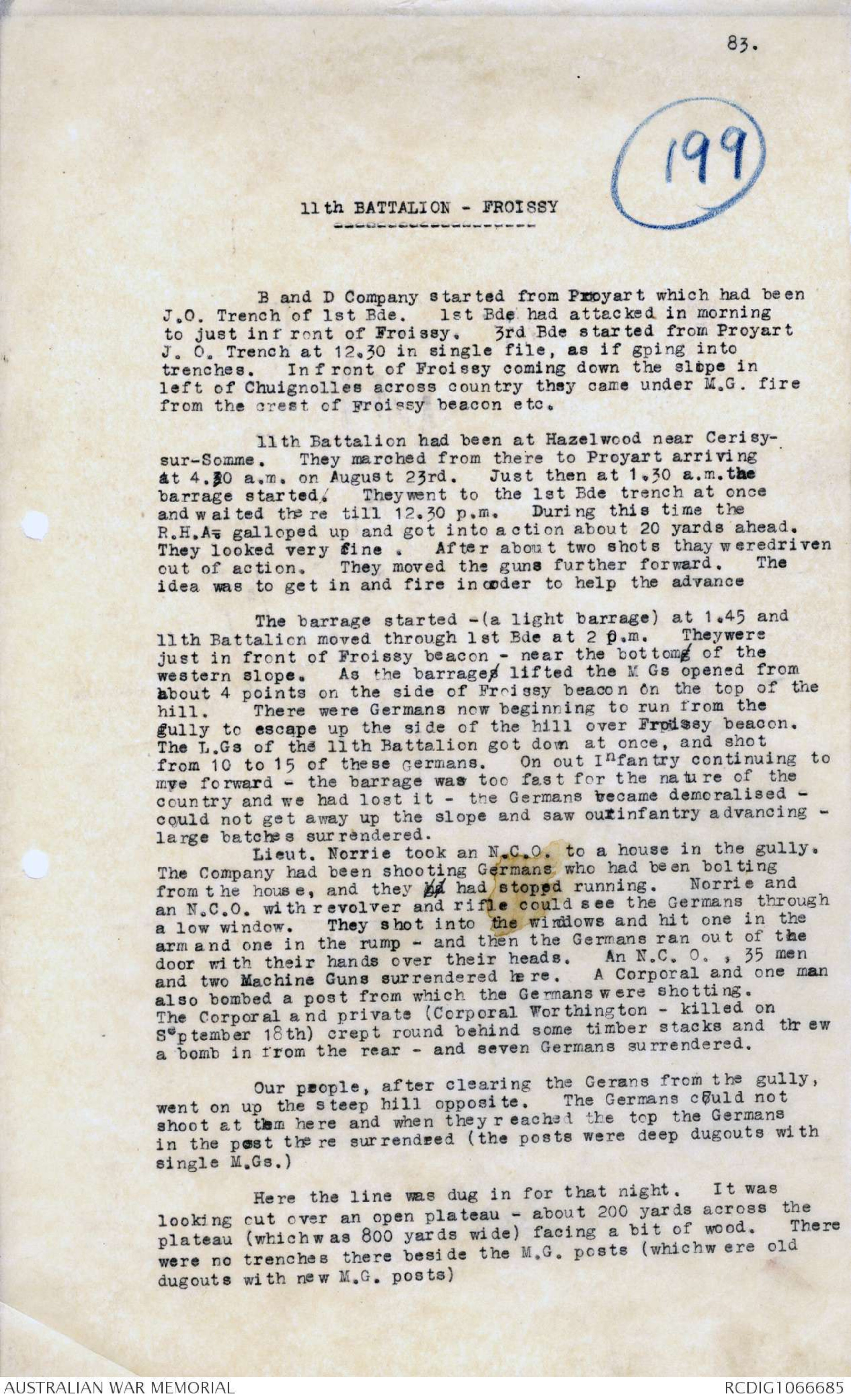
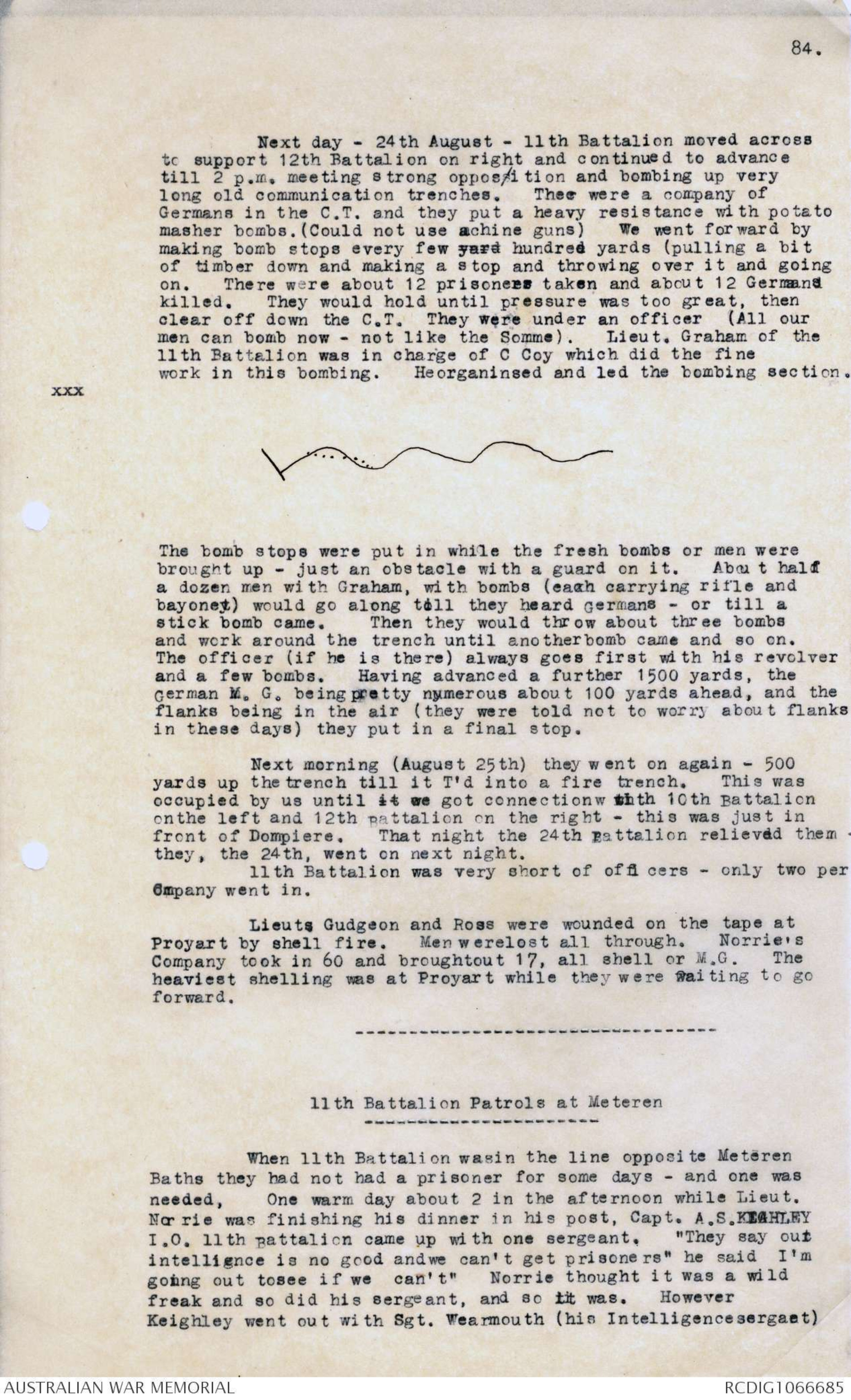
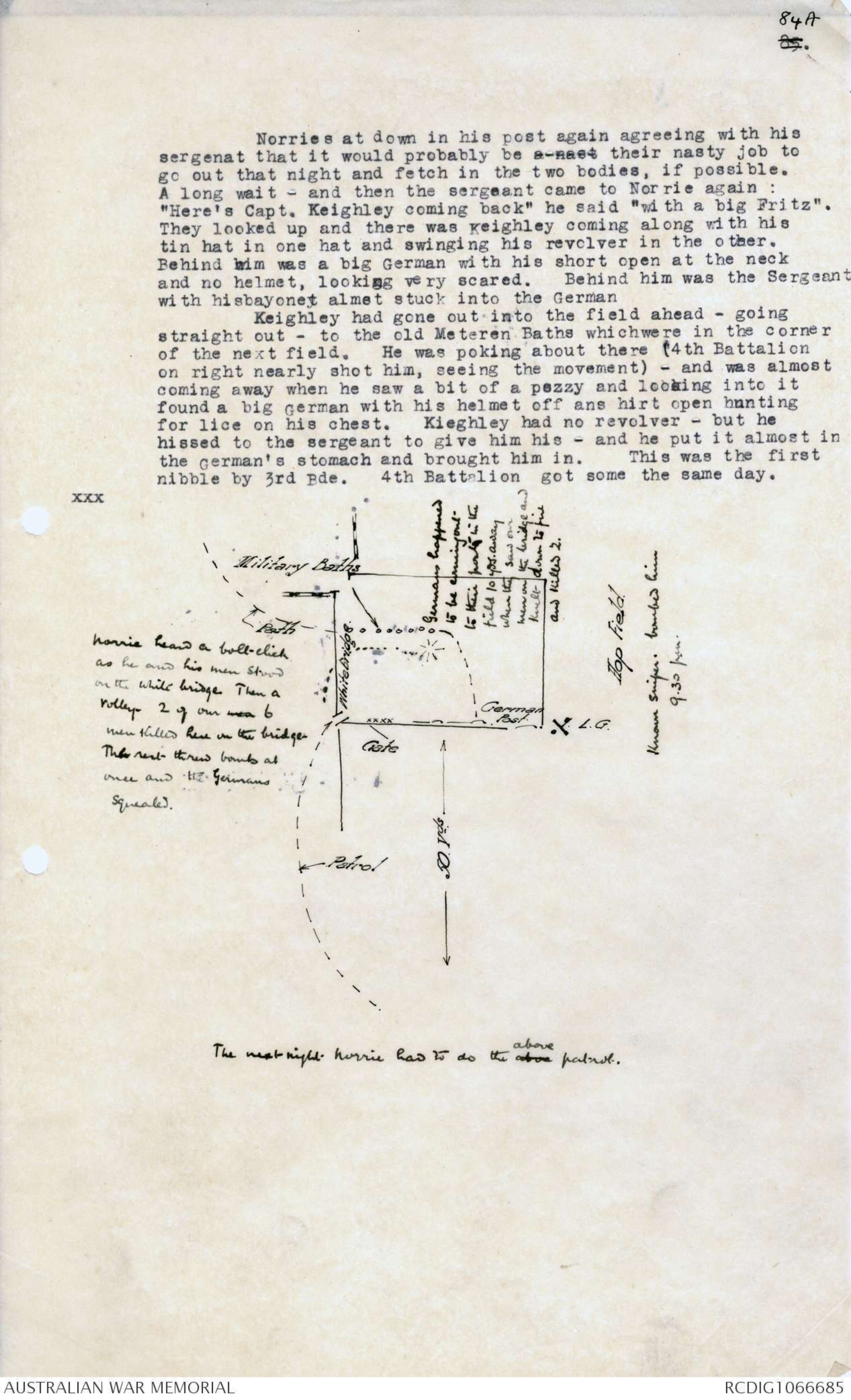
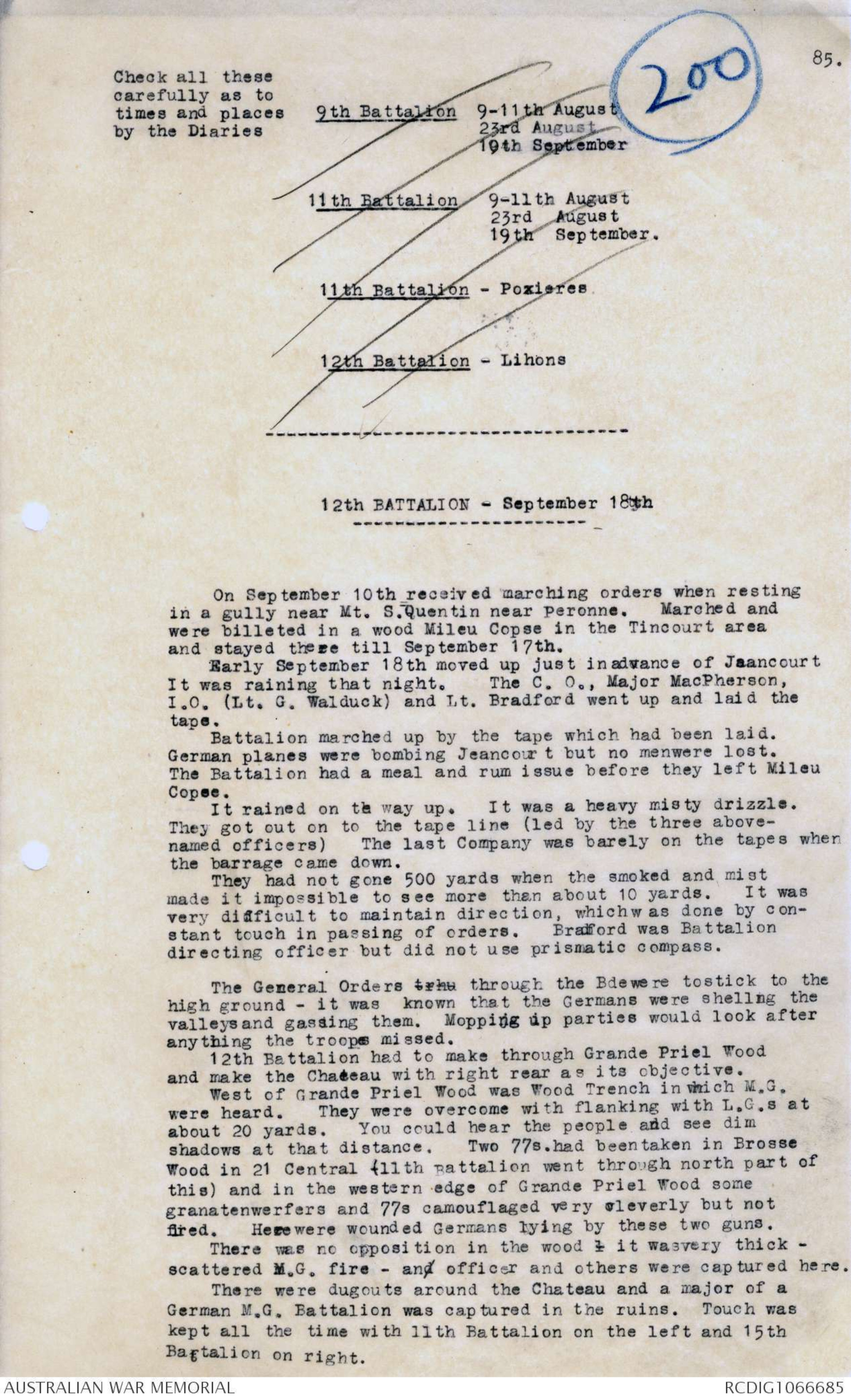
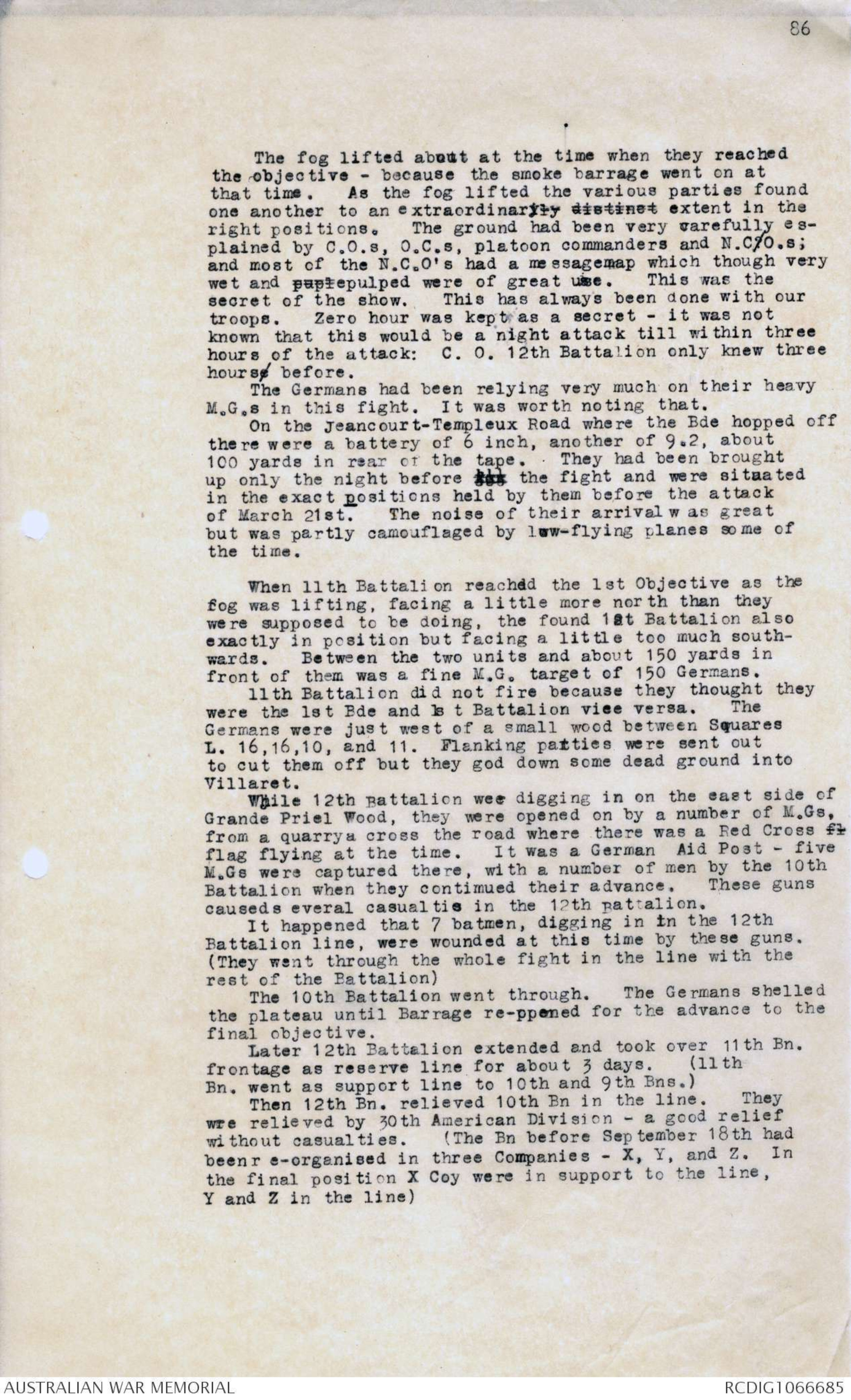
78.
Col. Smith they came on a Turk sitting in the scooped-out
trench - the colonel spoke, not seeing him, and the Turk
dashed down the gully to a patrol which he had there which
opened fire. Rafferty had Smith, Whitham and Steve Hart
(Corporal, later Lieut., killed at Meteren) with him that
night.
The scrub was burnt off after this.
Col. Smith had come out in order to see for himself the
pros and cons of the argument about having the battle posts
out. There was were as a matter of fact small battle posts
put out in the scrub like listening posts or sentry groups -
they were going out a little late this night (they generally
got out before dark). When the Turk patrol fired it caught
them going out and Sergt. Gillen was killed.
After this the scrub was burnt. It was then seen that
the Turk (who had been heard digging but not seen) was found
to have driven in a trench - a short sap - in to E. Before
then the Turk had been delayed in his digging by our bombing
at the sound.
The Turkish Leane's trench was dug later to join G and E
(it was like coming up and shooting over the edge of a sunken
road).
At the foot of Tasmania Post Ridge, where it flattened
out towards the sea, the Turks themselves tunnelled in from
their side and broke out in a trench which ran at right-angles
to the sea coast (X Y). He later put a little L.) shaped
trench onto this (after we had taken Leane's trench) so as to
enfilade Leane's.
The Light Horse were making their trench at A B at this
time and the Turks probably came out to counteract them.
xxx Diagram - see original document
MONDAY, APRIL 26.
Rafferty was near Saker in some trenches shaped like a
big A (where the guns had been). Saker was at X, Witham and
Rafferty at L. The trench from T to Z had been vacated in
the night by someone.
xxx Diagram - see original document
General Bridges came round in the morning walking with
three other officers. He saw the trenches at T Z xxx were
unoccupied. "They're rotten b---- trenches, anyway", he
said. In Brown's Dip a good many men were waiting. Witham
had gone then. There were men in the trench from S to X
facing the Chessboard.
At least an hour after Bridges left there came word from
Major Saker that they were to advance. Ross was there also.
Ross gave Rafferty his direction.
There was a line ahead of where Rafferty was - those from
X tp S and possibly from Brown's Dip. The Turks on seeing it
move got onto it with shrapnel. There was a lot of wavering
there - rush forward - rush back - rush forward. Then this
line in front went on. It was understood as being a general
advance - the word simply came: "You are going to advance".
Everyone was prepared to do this, without know where they
were going to.
On Saker's order the second line advanced and mingled
with the first - Rafferty trying to get sections organised.
They went across the Daisy Patch swinging left towards
79.
the Chessboard.
The ground on the right was broken with little knolls,
etc. On the left it was easier. They went easily 700
yards.
80.
1st BATTALION.
On 20 September we had advanced parties from two
brigades to relieve - 6th Bn to relieve lst Bn, and advance
parties were with the Coys. of 1st Bn. About 11 a.m.
G.O.C. (Glasgow) was up seeing Mackay at Bde. H.Q. when a
message from Division came up saying that the troops on
left were attacking Quennemont Farm next day and Corps
had ordered 1st Division to conform by taking certain
ground. This was a great surprise for Glasgow. He set
off for Division but before he went he showed Mackay what
1st Bde. would have to do - they would have to cancel the
relief - 2nd. Bde. would not have known the country (it
was clearly a job for Bde. in the line to do). He showed
Mackay the ground to be attacked. It was a matter for
two battalions. G.O.C. Division said the relief would be
postponed 24 hours. 2nd and 1st Bns. were the Bns. most
suited for the attack because they were the freshest - 1st.
were in the line and 2nd. out of it. Mackay asked that
the relief by 6th Bn should go on but rest of the relief
postponed, so that lst Bn could be brought out and moved
to the left. 2nd Bn. were already in support and could
easily be moved forward without relief.
Mackay took Artillery Bde. commander up to lst Bn H.Q.
about 1 p.m. and met all C.O.'s of 1st Bde, at the "Egg".
Mackay told them what was happening and unfolded the orders
verbally.
B.M. (at Bde. H.Q.) rang up and said there had been
an alteration in the plans and they were to prepare to do
one of three different things (one the same attack - the
others each an attack by one battalion). So Mackay had to
modify orders. It was clear 2nd Bn might not be required.
The alternative orders were given by Mackay to C.O.'s.
Telephone rang again and they had the definite order that
only a certain piece of high ground had to be seized - 3rd
Bn to conform by moving up a few posts, lst Bn to do the
attack (this was Mackay's order).
It was about 3 p.m. Mackay went back to Bde. to give
B.M. instructions and he got out a written order. All the
material was ready, Mackay had arranged with artillery and
M.G.'s.
Later on Zero hour was told them. Coys. had only to
draw material. Zero was 5.30 or 6 a.m.
At 1.30 a.m. Col. Stacey rang up Mackay and asked him
specially to come to the telephone. "Could Mackay place
some posts in rear to collect stragglers". Mackay asked
what he meant. Stacey said there had been some trouble and
some of the men were straggling out to the rear. Mackay
asked as to numbers - was it only one Coy.? or 1xBattn the
Battn.? Stacey said it was pretty serious, involving men
in all the Coys. They said they were not going to attack
and had marched out. But he could count on a fair number
of the men and was going on with the attack. He had seen
Capt. Collingwood, of 2nd Bn., and they had arranged for
Collingwood's Coy, to stand behind lst Bn. Stacey was very
determined to go on even if he only had himself anddH.Q.
Mackay in matters like this always told them that, if
occasion arose, they could arrange to support one another
and inform him (so as to save time - this was always well
done).
A platoon of 4th Bn was placed to collect stragglers
at the bottleneck where they must pass. There was not a
great deal of trouble expected in the attack. Staff Capt.
was sent to see about stragglers. He reported back that
there were none.
At about 4.30 a.m. Stacey rang up to say that he was on
81.
the assembly tape with 110 men. (Bn. strength 250 to 300
men - 120 went away). The attack took place at Zero,
succeeded and captured 50 prisoners).
Mackay made inquiries - could not find the men.
Nucleus Bn. (Capt. Bootle) rang up to say 60 men 1st. Bn.
had reported there - what was he to do with them. Mackay
ordered him to form them up, give them their meal, and
march them back. By then G.O.C. Division came up and Mackay
told him about the affair. While they were there a message
came from Bootle that there were about 100 men now and they
refused to go back. Glasgow was there - they sent for
Mackenzie, then C.O. 4th. Bn., and asked for what light he
could throw. They sent him back to use every effort to
march them to Bde. H.Q. to prevent it being too serious.
Mackay was going to H.Q. of Bns. when the Germans attacked
and drove the Tommies out on the left and 3rd Bn made a flank
to 1st Bn. This kept Mackay busy. At the end of the day
Mackenzie reported to Mackay that he had got these men to the
E. side of Roisel but they were dead beat and could not march
further without a rest. While they were resting he came on
to Bde.
The relief was then going on. Mackay told Mackenzie
to put these men inxthere in the trenches at Roisel and give
them the nominal duty of remaining there and hold these
trenches till further ordered. The 1st Bn. went to the other
flank behinf Jeancourt and were instructed to send these men
rations.
It was a very difficult affair. Mackay wanted to handle
it firmly and yet not make it worse. Mackay had intended
when they got to Bde. to look at them and then put them
behind the Battn., but it was too late then so he put them
before Roisel. Next day Mackay inspected them - had a look
at the men - they were all right, only one or two appeared
a little insolent, the others behaved normally. Mackay told
them what the Battn. had done without them. Mackay told
them that in the meantime, till the inquiry. they were
soldiers and would remain where they were as reserve to the
Bde. to be called on if required. Meantime arrangements
were made for a compound near Proyart.
The next day they were marched to the reinforcement camp
under a mixed guard of specially selected men - they piled
their arms at the reinforcement camp and were then told that
they were under arrest and would be in the compound under
this guard.
When Bn. came out each man went before C.O. in orderly
room and then sent on for Court-Martial.
They are still (Nov. 27) away in Corps Compound at
Flixecourt.
The first case of desertion in 4th Bn. was in August
1916, between the two tours in the line. D.A.Q.M.G.'s and
all sorts of officers came down; now there is almost one
deserter per week.
In this first case the sentence was death; this was
commuted to 15 years; later he was let out. In those days
the court-martial was an event - and it had a big effect on
the Battalion to hear this case.
Later the Court-Martials became less formidable and
A.W.L. much greater. The Court-Martial had less and less
effect. Now a man goes for a C.M. He is sentenced - does
three months and meets other bad men. He comes back and
takes three men with him. They do six months and then goes
back to the Battn., break from the guard - and does it again.
During their liberty they rob their drunken companions, get
to Paris - break from the guardroom - get to Paris again.
After six months they probably get into "Quod". This is
ordinarily not very severe and the thing is now a profession.
82.
This certainly exists now as a system owing to the sentences
of Courts-Martial not being enforced. The men are let out
from prison if they give no trouble - even if the battalion
has not recommended that the sentence should be suspended.
(If a battalion recommends this he has to wait in a
divisional or corps compound, not a prison, until the papers
go through.
He does not go to a prison till battalion sends
through a commitment form to a governor of a prison).
This is due to a policy of weakness and has imposed
tremendous worry on Battalion C.O.'s.
If luxuries (smokes, etc.) were not given in prison it
would have a very deterrent effect. There is no comparison
between the discomfort of a prison and the trenches, and it
has been preached by these men as a doctrine.
The men were in all cases found NOT GUILTY of "joining
in a mutiny", but GUILTY of "Desertion".
[*199*]
83.
11th BATTALION - FROISSY
B and D Company started from Proyart which had been
J.O. Trench of 1st Bde. 1st Bde had attacked in morning
to just inf ront of Froissy. 3rd Bde started from Proyart
J. O. Trench at 12.30 in single file, as if gping into
trenches. In front of Froissy coming down the slope in
left of Chuignolles across country they came under M.G. fire
from the crest of Froissy beacon etc.
11th Battalion had been at Hazelwood near Cerisy-
sur-Somme. They marched from there to Proyart arriving
at 4.30 a.m. on August 23rd. Just then at 1.30 a.m. the
barrage started. Theywent to the 1st Bde trench at once
and waited there till 12.30 p.m. During this time the
R.H.A. galloped up and got into action about 20 yards ahead.
They looked very fine. After about two shots thay weredriven
out of action. They moved the guns further forward. The
idea was to get in and fire in order to help the advance
The barrage started -(a light barrage) at 1.45 and
11th Battalion moved through 1st Bde at 2 p.m. Theywere
just in front of Froissy beacon - near the bottomg of the
western slope. As the barrages lifted the M Gs opened from
about 4 points on the side of Froissy beacon on the top of the
hill. There were Germans now beginning to run from the
gully to escape up the side of the hill over Froissy beacon.
The L.Gs of the 11th Battalion got down at once, and shot
from 10 to 15 of these Germans. On out Infantry continuing to
mve forward - the barrage was too fast for the nature of the
country and we had lost it - the Germans became demoralised -
could not get away up the slope and saw ourinfantry advancing -
large batches surrendered.
Lieut. Norrie took an N.C.O. to a house in the gully.
The Company had been shooting Germans, who had been bolting
from the house, and they kd had stoppd running. Norrie and
an N.C.O. with revolver and rifle could see the Germans through
a low window. They shot into the windows and hit one in the
arm and one in the rump - and then the Germans ran out of the
door with their hands over their heads. An N.C. O., 35 men
and two Machine Guns surrendered here. A Corporal and one man
also bombed a post from which the Germans were shotting.
The Corporal and private (Corporal Worthington - killed on
September 18th) crept round behind some timber stacks and threw
a bomb in from the rear - and seven Germans surrendered.
Our people, after clearing the Germans from the gully,
went on up the steep hill opposite. The Germans could not
shoot at them here and when they reached the top the Germans
in the post the re surrendred (the posts were deep dugouts with
single M.Gs.)
Here the line was dug in for that night. It was
looking out over an open plateau - about 200 yards across the
plateau (which was 800 yards wide) facing a bit of wood. There
were no trenches there beside the M.G. posts (whichw ere old
dugouts with new M.G. posts)
84.
Next day - 24th August - 11th Battalion moved across
to support 12th Battalion on right and continued to advance
till 2 p.m. meeting strong oppossition and bombing up very
long old communication trenches. There were a company of
Germans in the C.T. and they put a heavy resistance with potato
masher bombs. (Could not use achine guns) We went forward by
making bomb stops every few yard hundred yards (pulling a bit
of timber down and making a stop and throwing over it and going
on. There were about 12 prisoners taken and about 12 Germans
killed. They would hold until pressure was too great, then
clear off down the C.T. They were under an officer. (All our
men can bomb now - not like the Somme). Lieut. Graham of the
11th Battalion was in charge of C Coy which did the fine
work in this bombing. Heorganinsed and led the bombing section.
xxx Diagram - see original document
The bomb stops were put in while the fresh bombs or men were
brought up - just an obstacle with a guard on it. About half
a dozen men with Graham, with bombs (each carrying rifle and
bayonet) would go along till they heard Germans - or till a
stick bomb came. Then they would throw about three bombs
and work around the trench until anotherbomb came and so on.
The officer (if he is there) always goes first with his revolver
and a few bombs. Having advanced a further 1500 yards, the
German M. G. being pretty numerous about 100 yards ahead, and the
flanks being in the air (they were told not to worry about flanks
in these days) they put in a final stop.
Next morning (August 25th) they went on again - 500
yards up the trench till it T'd into a fire trench. This was
occupied by us until it we got connection with 10th Battalion
onthe left and 12th battalion on the right - this was just in
front of Dompiere. That night the 24th Battalion relieved them -
they, the 24th, went on next night.
11th Battalion was very short of offi cers - only two per
Company went in.
Lieuts Gudgeon and Ross were wounded on the tape at
Proyart by shell fire. Men werelost all through. Norrie's
Company took in 60 and broughtout 17, all shell or M.G. The
heaviest shelling was at Proyart while they were waiting to go
forward.
11th Battalion Patrols at Meteren
When 11th Battalion wasin the line opposite Meteren
Baths they had not had a prisoner for some days - and one was
needed, One warm day about 2 in the afternoon while Lieut.
Norrie was finishing his dinner in his post, Capt. A.S.KEGHLEY
I.O. 11th Battalion came up with one sergeant, "They say our
intellignce is no good andwe can't get prisoners" he said I'm
going out tosee if we can't" Norrie thought it was a wild
freak and so did his sergeant, and so it was. However
Keighley went out with Sgt. Wearmouth (his Intelligencesergaet)
84A 85.
Norrie sat down in his post again agreeing with his
sergenat that it would probably be a-nast their nasty job to
go out that night and fetch in the two bodies, if possible.
A long wait - and then the sergeant came to Norrie again :
"Here's Capt. Keighley coming back" he said "with a big Fritz".
They looked up and there was Keighley coming along with his
tin hat in one hat and swinging his revolver in the other.
Behind him was a big German with his short open at the neck
and no helmet, looking very scared. Behind him was the Sergeant
with hisbayonet almet stuck into the German
Keighley had gone out into the field ahead - going
straight out - to the old Meteren Baths whichwere in the corner
of the next field. He was poking about there (4th Battalion
on right nearly shot him, seeing the movement) - and was almost
coming away when he saw a bit of a pozzy and looking into it
found a big German with his helmet off ans hirt open hunting
for lice on his chest. Kieghley had no revolver - but he
hissed to the sergeant to give him his - and he put it almost in
the German's stomach and brought him in. This was the first
nibble by 3rd Bde. 4th Battalion got some the same day.
xxx Diagram - see original document
[*200*]
85.
Check all these
carefully as to
times and places
by the Diaries9th Battalion 9-11th August 23rd August 19th September11th Battalion 9-11th August 23rd August 19th September11th Battalion - Pozieres12th Battallion - Lihons
12th BATTALION - September 18th
On September 10th received marching orders when resting
in a gully near Mt. S.Quentin near Peronne. Marched and
were billeted in a wood Mileu Copse in the Tincourt area
and stayed there till September 17th.
Early September 18th moved up just in advance of Jeancourt
It was raining that night. The C. O., Major MacPherson,
I.O. (Lt. G. Walduck) and Lt. Bradford went up and laid the
tape.
Battalion marched up by the tape which had been laid.
German planes were bombing Jeancourt but no menwere lost.
The Battalion had a meal and rum issue before they left Mileu
Copse.
It rained on th way up. It was a heavy misty drizzle.
They got out on to the tape line (led by the three above-named
officers) The last Company was barely on the tapes when
the barrage came down.
They had not gone 500 yards when the smoked and mist
made it impossible to see more than about 10 yards. It was
very difficult to maintain direction, whichwas done by constant
touch in passing of orders. Bradford was Battalion
directing officer but did not use prismatic compass.
The General Orders trhu through the Bdewere tostick to the
high ground - it was known that the Germans were shelling the
valleysand gassing them. Mopping up parties would look after
anything the troops missed.
12th Battalion had to make through Grande Priel Wood
and make the Chateau with right rear as its objective.
West of Grande Priel Wood was Wood Trench in which M.G.
were heard. They were overcome with flanking with L.G.s at
about 20 yards. You could hear the people and see dim
shadows at that distance. Two 77s.had beentaken in Brosse
Wood in 21 Central (11th Battalion went through north part of
this) and in the western edge of Grande Priel Wood some
granatenwerfers and 77s camouflaged very cleverly but not
fired. Herewere wounded Germans lying by these two guns.
There was no opposition in the wood 1 it wasvery thick -
scattered M.G. fire - and officer and others were captured here.
There were dugouts around the Chateau and a major of a
German M.G. Battalion was captured in the ruins. Touch was
kept all the time with 11th Battalion on the left and 15th
Battalion on right.
86
The fog lifted about at the time when they reached
the objective - because the smoke barrage went on at
that time. As the fog lifted the various parties found
one another to an extraordinaryly distinct extent in the
right positions. The ground had been very carefully esplained
by C.O.s, O.C.s, platoon commanders and N.C?O.s;
and most of the N.C.O's had a messagemap which though very
wet and puplpulped were of great use. This was the
secret of the show. This has always been done with our
troops. Zero hour was kept as a secret - it was not
known that this would be a night attack till within three
hours of the attack: C. O. 12th Battalion only knew three
hourss before.
The Germans had been relying very much on their heavy
M.G.s in this fight. It was worth noting that.
On the Jeancourt-Templeux Road where the Bde hopped off
there were a battery of 6 inch, another of 9.2, about
100 yards in rear of the tape. They had been brought
up only the night before xxx the fight and were situated
in the exact positions held by them before the attack
of March 21st. The noise of their arrival was great
but was partly camouflaged by low-flying planes some of
the time.
When 11th Battalion reached the 1st Objective as the
fog was lifting, facing a little more north than they
were supposed to be doing, the found 1st Battalion also
exactly in position but facing a little too much southwards.
Between the two units and about 150 yards in
front of them was a fine M.G. target of 150 Germans.
11th Battalion did not fire because they thought they
were the 1st Bde and 1st Battalion vice versa. The
Germans were just west of a small wood between Squares
L. 16,16,10, and 11. Flanking parties were sent out
to cut them off but they god down some dead ground into
Villaret.
While 12th Battalion wer digging in on the east side of
Grande Priel Wood, they were opened on by a number of M.Gs.
from a quarrya cross the road where there was a Red Cross fr
flag flying at the time. It was a German Aid Post - five
M.Gs were captured there, with a number of men by the 10th
Battalion when they contimued their advance. These guns
causeds everal casualties in the 12th Battalion.
It happened that 7 batmen, digging in in the 12th
Battalion line, were wounded at this time by these guns.
(They went through the whole fight in the line with the
rest of the Battalion)
The 10th Battalion went through. The Germans shelled
the plateau until Barrage re-ppened for the advance to the
final objective.
Later 12th Battalion extended and took over 11th Bn.
frontage as reserve line for about 3 days. (11th
Bn. went as support line to 10th and 9th Bns.)
Then 12th Bn. relieved 10th Bn in the line. They
wre relieved by 30th American Division - a good relief
without casualties. (The Bn before September 18th had
beenr e-organised in three Companies - X, Y, and Z. In
the final position X Coy were in support to the line,
Y and Z in the line)
 Diane Ware
Diane WareThis transcription item is now locked to you for editing. To release the lock either Save your changes or Cancel.
This lock will be automatically released after 60 minutes of inactivity.